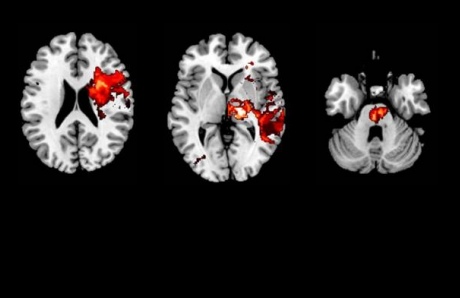Computer test reveals high prevalence of attention disorders in stroke patients
by Sam Wong

A majority of stroke patients have problems paying attention and could be helped by brain-training computer games, a new study suggests.
Researchers at Imperial College London found that problems such as difficulty filtering out distractions, difficulty following instructions, and reduced alertness are much more common in stroke patients than doctors realise.
Their study, published in Neurology, showed that brain scans and bedside tests can be used to diagnose these three types of attention problems, each of which could be addressed with computer games tailored for the patient’s requirements.
An estimated 150,000 people in the UK have a stroke each year. It can cause a wide range of effects on the mind and body, including problems with memory, attention and speech; emotional problems and physical disability.
The study involved 110 patients being treated at Charing Cross Hospital, a major centre for stroke care in west London. Five of them were already diagnosed with a serious attention disorder called neglect, but computerised tests showed that over half of them had attention problems that hadn’t been recognised.
The type of problem appeared to depend on which part of the brain had been affected by the stroke. Patients with strokes affecting the front of the brain had difficulty filtering out distraction; strokes towards the back of the brain caused difficulty following instructions; while strokes in the centre of the brain caused a general reduction in alertness.
The researchers suggest that doctors could use brain scans to predict what type of problem a stroke patient would be likely to have. Computerised tests could then confirm the diagnosis, and the patient could be offered therapy based on their individual condition.

Brain scans reveal damage to different areas of the brain affecting different aspects of attention.
The study’s senior author, Dr Paul Bentley, from the Department of Medicine at Imperial College London, said: “We found that more than half of stroke patients have some form of attention problem, and these may be missed by routine bedside examinations.
“We’ve shown that specialised computer games are very sensitive at picking up deficits in stroke patients. They can also be tailor-made for each patient to rehabilitate them for the specific deficit they show. These findings therefore suggest a new strategy by which stroke treatments can be personalised depending on information gained from patients’ brain scans.”
Patients might also benefit from tailored drug therapies, Dr Bentley said. The three types of attention problems the researchers found correspond to three networks in the brain controlled by different brain chemicals. Drugs that modulate the release of these chemicals are already available for use in other neurological conditions, which the researchers suggest exploring as specific treatments for patients with different types of impairments.
The study was funded by the National Institute for Health Research Imperial Biomedical Research Centre.
Reference
P Rinne et al. ‘Triple dissociation of attention networks in stroke according to lesion location.’ Neurology, August 27, 2013 vol. 81 no. 9 812-820 doi: 10.1212/WNL.0b013e3182a2ca34
Article text (excluding photos or graphics) © Imperial College London.
Photos and graphics subject to third party copyright used with permission or © Imperial College London.
Reporter
Sam Wong
School of Professional Development